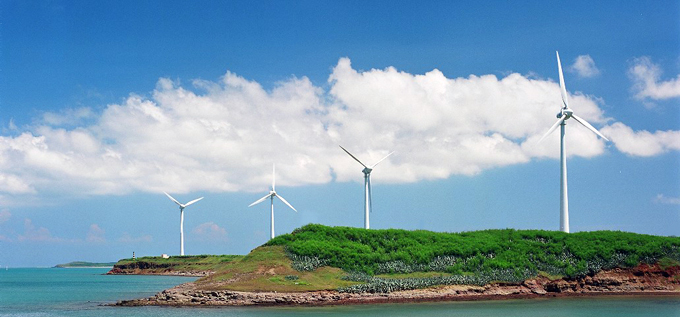

President Ma Ying-jeou has promised to consider revising the renewable energy law after a wind power company complained about restrictions on selling electricity directly to clients.
Ma made the promise during a visit to the coastal Changpin Industrial Zone in Central Taiwan where there are many wind turbines. He met with energy officials and company representatives to learn about wind power operations there.
But Karl-Eugen Feifel, chairman of the Germany-based wind power company InfarVest, complained to Ma.
Feifel, whose company is a major wind power supplier at Changpin, said there is a lack of incentives for investors seeking to enter the renewable energy sector in Taiwan.
Feifel said wind power operators are not allowed to sell their electricity directly to clients, but only through the state-run Taiwan Power Company (Taipower), which profits from the differences in the purchasing and reselling prices.
He cited Google as an example, saying the U.S. firm is building facilities right next to InfraVest, but Taipower is barring InfraVest from selling electricity directly to Google.
He noted that currently Taipower purchases wind power at NT$2.59 per unit, and resells it at NT$3 per unit. Wind power operators are hoping that the Taipower purchase price can increase to at least NT$2.8 per unit, so as to attract more investors, Feifel said.
He also challenged the Bureau of Energy’s (BOE) claims that wind power is not a stable source of electricity and can only be a back-up. He said wind power is already a primary source of electricity in Europe, and in Spain, wind power accounts for 25 percent of the country’s electricity.
The president said it is a set policy of the government to develop renewable energy, but its implementation may take many different forms. He said the government may consider the company’s suggestions when revising the law in the future.
Jerry Ou, director-general of the BOE, told the president that Taiwan does not have sufficient hours of wind to provide stable wind power.
He said Taiwan has 8,760 hours of usable wind for generating electricity annually, and large investments must be made before wind power can become a major source of energy.
Currently there are 314 wind turbines in Taiwan, 161 of which belong to Taipower, he said. The wind turbines generate 1.5MW of electricity a year, or only 0.7 percent of the total electricity generated in Taiwan, he added.
Taiwan has met strong resistance from the general public over the continued use of nuclear power, but it has also run into many obstacles to developing clean energy.
Many residents object to setting up wind turbines in their neighborhoods because of concerns such as noise pollution. Some even cite “feng shui” concerns.
Taiwan is a major exporter of solar cells, but the use of solar energy in Taiwan is rare because of its high costs and lack of incentives from the government.
Gallagher Re has shed light on the significant challenges insurers face when providing coverage for…
The Australian government will disburse AUD 1.7 million (USD 1.1m/EUR 1m) in grant funding to…
GlobalData’s latest report, ‘Asia Pacific Renewable Energy Policy Handbook 2024’ is among the latest region-specific…
The electrical generation market is facing a number of challenges, including the need to increase…
Nuclear energy has emerged as a prominent player in Asia's energy landscape, offering a reliable…
The pursuit of a low-carbon future has gained significant momentum globally, and Asia stands tall…